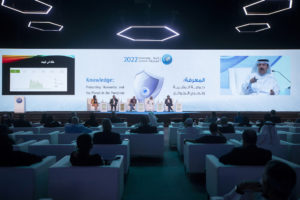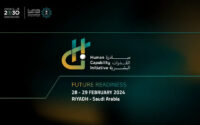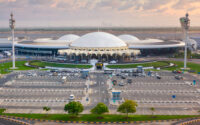Knowledge Summit Discusses The Media’s Role And Impact During Crisis
The role and impact of the media during the COVID-19 crisis has been extensively discussed in a panel discussion held on the sidelines of the seventh edition of the Knowledge Summit. Themed‘The Role & Impact of Media During Crisis: Reflecting on COVID-19’, several leading media personalities including H.E. Karam Gabr, Head of the Supreme Council for Media Regulation in Egypt; Ali Jaber, Group TV Director, MBC Group; Ali Obaid Al Hameli, News Centre Department Director at Dubai Media; and Michael Peters, Chairman of the Board of Directors at EuronewsSA addressed the topic; and was moderated by TV presenter LojainOmran.
The session tackled several issues surrounding media’s capabilities especially during crisis such as the widespread misinformation dubbed as ‘info-demic’, the importance of trusted sources during times of uncertainty, the narratives surrounding COVID-19 and the forms of storytelling, as well as debunking misleading ideas such as conspiracy theories.
Gabrdiscussed the media’s role during the Covid-19 pandemic in Egypt, particularly social media which had exacerbated the crisis due to rampant misinformation. The practices were additional burdens to official media outlets as they had to make multiple efforts to deny and correct misleading news and information circulated within the community. Gabrreiterated that apart from disseminating facts, the media plays a role in helping raise awareness and equip people with knowledge on how to verify information and avoid the spread of false news and misinformation.
Ali Jaber explained that the media in some countries have played an important role in influencing society especially during the Covid-19 pandemic where a crosssection of the society were convinced not to take the vaccine, which had exacerbated the health conditions in those countries. He cited the laws implemented by Arab Gulf countries against spreading rumors and false news have helped these countries deal with the pandemic more effectively.
Jaber reviewed the UAE experience in dealing with the pandemic with integrity and transparency, citing the government’s strong decisions, laws, and legislation which have contributed to the control of misinformation, particularly on social media. This has had a significant impact on limiting the spread of wrong information and at the same time, contributed to encouraging community members to take the vaccine. He further highlighted that the greatest challenge in the media is putting laws and legislations in place to control the chaos in the posting on social media.
Ali Al Hamelishared his views that during the pandemic, the unreliability of information in social media had boosted the credibility and reliability of traditional media which became the first reference and source of correct information. Hameli also presented the experience of the News Centre at Dubai Media during the pandemic and the role it played in raising community awareness.
For his part, Michael Peters of Euronews remarked that knowledge is the accumulation of information and that traditional media had taken a major role during the Covid-19 pandemic to provide correct information, adding that social media has failed to pass the test of credibility and has brought up many negative aspects in terms of handling rumors and fake news, spreading fear, panic, and anxiety in society. This has led to people relying more on traditional media to obtain accurate information.
The Mohammed Bin Rashid Al Maktoum Knowledge Foundation (MBRF) is organizing the seventh edition of the Knowledge Summit in collaboration with the United Nations Development Programme (UNDP) under the theme ‘Knowledge: Protecting Humanity and the Planet in the Pandemic’ at Expo 2020 Dubai. The event in-person event took place on March 14 and 15 and would continue onMarch 16 to 18 via virtual sessions, with the participation of experts, leaders, and government officials from around the world.







